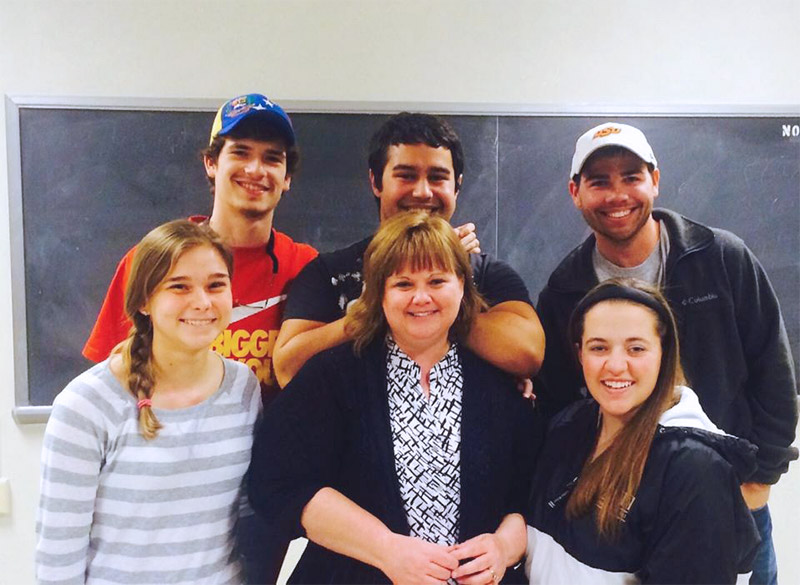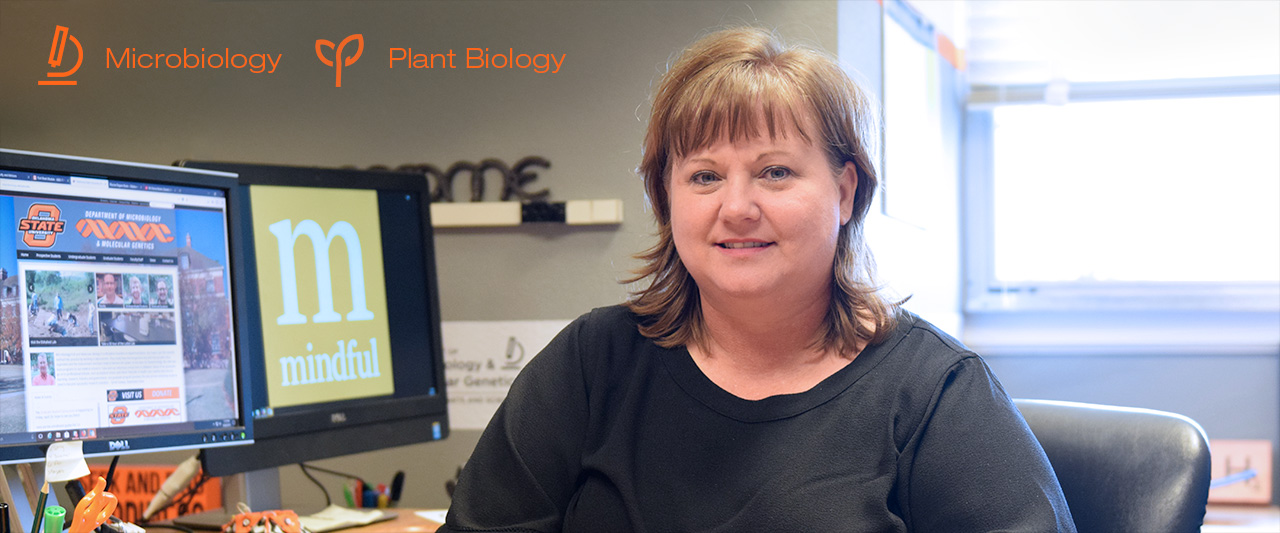The “Student First Aid Station” in Dana Hatter’s office in Life Sciences East is stocked not only with band-aids and ibuprofen, but also with boxes marked “Popcorn” and “Hot Chocolate.”
“I call all of the students I advise my kids,” Hatter joked, “and I basically am a mom 24/7, both at home and here.”
“At college one of my professors said that our past didn’t matter,” Hatter recalled. “We were at an age that you could redesign our future. I took that to heart. Education was the key to changing my life. The College of Arts and Sciences might be the largest college, but we are also very homey.
“I love being in a college setting that helps students reshape their future. This is the time in a person’s life that it doesn’t matter where they came from, it is up to them to change their lives. I love being part of that journey.”
Hatter’s career at Oklahoma State University began nearly 12 years ago in Morrill Hall, where she first worked as an adjunct English professor for six years before accepting a student advisory position.
“I always wanted to be at the collegiate level, and the timing worked out perfectly,” she recalled. “I was really good friends with one of the zoology advisors and I knew how much she loved her job.”
Hatter has been an advisor for the Department of Microbiology and Molecular Genetics and the Department of Plant Biology, Ecology and Evolution for six years now, and won College Arts and Sciences 2018 Advisor of the Year.
“Dana’s heart for advising and mentoring has no limits,” said Tyrrell Conway, Microbiology department head. “She feeds students when they are hungry, gives advice that is perfect whatever the situation, encourages hard work, and teaches the skills that allow students to overcome obstacles and achieve more than they thought they could. Dana makes students feel at home in our program and as a result the number of Microbiology majors has increased 40 percent in the past three years.”
“Dana is the most caring and involved advisor that I have met at OSU,” said Andrew Doust, Plant Biology department head. “She constantly tries to interpret what students want and need, from a four-year plan to get into law school to a candy bar to get through the day. She has been incredibly helpful to OSU – Plant Biology in turning students on to the wonder and practical career advantages of plant biology. There is no doubt that she is totally committed to the welfare and success of her students – and it is clear that they love and appreciate her.”

Hatter’s favorite thing about OSU is that it truly lives the land-grant mission.
“I know that sounds so cliché, but OSU is very service-oriented,” Hatter said. “Working at a college can feel very much like selling used cars, but OSU really works to help the kids find out what they want, and put the good of the students first. The exciting thing about my students being science majors is that many of the jobs they’re training for haven’t even been created yet.”
Five years ago, Hatter’s health took a turn for the worst. The medical diagnosis was grim.
“Even the Mayo Clinic could only rule out illnesses, but couldn’t pinpoint why my body was shutting down,” Hatter said. “Luckily, my eye doctor and dentist worked closely with my primary care physician. They all recommended I try OMRF. I was in a very difficult place, wondering if I really was where I needed to be. And then the universe comes along and says, ‘Yes, absolutely.’”
One of Hatter’s students, Nicolas Means, had just graduated and gotten into a Ph.D. program at the OU Health Sciences Center.
“It is interesting because I really wanted to do medical research when I got to grad school and OUHSC was a great fit for me to accomplish this while staying semi-close to home,” Means said. “Because OUHSC and OMRF (the Oklahoma Medical Research Foundation) have such a great relationship, the two institutions allow for graduate students to try labs at OMRF, which has a world-renowned autoimmunity clinic, including research with Sjogren’s Syndrome.”
Means and Hatter reconnected at a Microbiology lunch reunion during Homecoming, and he told her about the exciting research he had been doing for Sjogren’s Syndrome.
“My jaw just hit the floor because I had just been diagnosed with Sjogren’s Syndrome,” Hatter recalled. “And after we talked for a little bit longer, it hit us that it was his lab that had been instrumental in my diagnosis. Ever since then, I’ve been on a correct medical path and made a full recovery. One of my ‘kids’ has been instrumental at literally saving my life.”
With her youngest daughter starting as a freshman at OSU this semester, Hatter has full confidence in her “kids,” biological and academic.
“It just fills me with mommy pride: I believe in OSU students, and I know and have seen first-hand that our students can hang with the big dogs in any field into which they go.”

